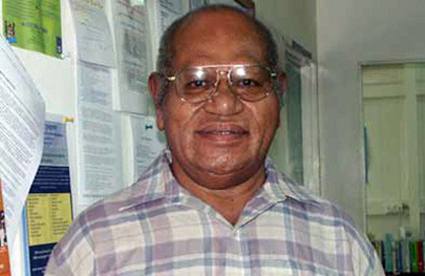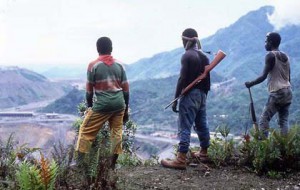
Panguna community members are warning the Bougainville government that efforts must be made to heal the deep trauma caused by the decade-long civil war before arrangements to reopen the mine take place. Asia-Pacific Journalism's Eva Corlett reports on the issue.
A cross-section of the Bougainville community living near Panguna mine have expressed near universal opposition to the prospect of the mine re-opening, says a recent report.
Non-government organisation Jubilee Australia released the report, Voices of Bougainville, last week, which details individual and community response to the possibility of re-opening the mine.
The report interviewed 65 individuals from key villages near the site, including community leaders, youth, men and women, as well as conducting a focus group discussion with 17 participants.
Bougainville autonomous region President John Momis has dismissed the report after the Greens Party introduced it to the Federal Parliament last week, accusing it of being “misleading” and “irresponsible”, reports ABC news.
But community members are warning the government that efforts must be made to heal the deep trauma caused by the decade-long civil war before arrangements to re-open the mine take place.
The mine, which was run by the Australian mining giant Rio Tinto-owned Bougainville Copper Limited (BCL), closed in 1989 when the Bougainville Revolutionary Army, alongside landowners, revolted.
The rebels alleged major environmental damage, loss of land and degeneration of human rights.
Since the war, much of the area around the mine has been under the control of the Me’ekamui Tribal Government, led by its President Phillip Miriori, and is secured from outsiders unless special permission is granted.
Economic independence
Amid a push toward economic independence from Papua New Guinea, the government has been considering the re-opening of the mine.
Panguna mine is heavily resource-rich in gold and copper and once generated considerable revenue for the country.
Part of the protest against the mine was due to just 1.4 percent of revenue going back into the Panguna community.
Recently, the government passed the Bougainville Transitional Mining Bill, eliminating previous PNG mining law, solidifying the province’s customary land rights and giving the landowners right to give consent to exploration.
Furthermore it purports to strip BCL of all its previous rights.
But the legislation has been met with some criticism.
The Mineral Policy Institute issued a legal opinion last year stating the draft law fails to fully protect landowner rights.
Since the passing of the bill one year on, little has changed materially, says PNG Minewatch.
Criminologist Dr Kristian Lasslett, whose research area focuses on the juncture between state-corporate power and resurgent communities, says there is some confusion about what the law really means.
‘The immediate sound bites (at least to the media) was that this was a great victory against Rio Tinto and that the ABG had the power and were taking away their mining rights,” he says.
But BCL’s mining lease expired in 2011 and its exploration licences, which it had held for 40 or 50 years, are due to expire in a couple of months, he says.
“So the intrinsic value of what they had there was zero.”
Dr Lasslett says that while they have rights to re-apply, legal opinion will vary as to whether those rights of re-issue would be guaranteed.
The report undermines assertions given by the Autonomous Bougainville Government (ABG) that the majority of the community supports re-opening.
The report says “anecdotal evidence from the communities most acutely affected by the mine’s operation, and the subsequent conflict, has suggested there are significant currents of opposition”.
Reconciliation process
Jubilee Australia executive director Brynnie Goodwill says the question of whether or not to re-open the mine is the wrong question to be asking at this stage.
It should be “what needs to be done for Bougainvillians right now to help them address some of the issues they want to address as a society”, she says.
“There hasn’t yet been reconciliation and accountability around these issues.
“It’s kind of like building a building where there’s a weak foundation – there’s fragility. And mistrust.”
The reconciliation process would need to be directed by Bougainvillians, she says.
“If you overlay a design that doesn’t follow [their] values and there’s nothing to replace those values, then there’s a major disruption.”
According to the report of the 41 respondents who specifically discussed the Bougainville Peace Agreement and the associated reconciliation efforts, there was “uniform dissatisfaction”.
Although some felt peace had been restored, other problems the families face had not been adequately addressed, it says.
“We need reconciliation from one end of the island to the other,” says a community leader from Guava.
“And we need to restore the relationship with the bodies that have rotted in the jungle by bringing them back to their village and giving them some form of dignity by doing a proper burial.”
Dr Lasslett says this is “more than just broken bonds between communities; it’s about broken bonds between communities and their land”.
Minority representation
The landowners are represented by the United Panguna Mine Affected Landowners Association, or UPMALA, which is considered the legitimate representative body by the ABG and BCL.
But Dr Lasslett, says there is currently no representative body that “actually articulates the vast majority view of the communities in Panguna and in the mine area”.
The only bodies that exist represent the views of a very small minority, he says.
“There is a clash of two very different systems.”
One faction campaigns for greater economic benefits for the Panguna region.
The other faction, originally led by Francis Ona of the BRA, campaigns for the permanent shutdown of the mine as it is incompatible with rural culture, economic and political practices, says Dr Lasslett.
“The ABG seem to be of the view that the mine must open. They believe that that’s the only economic group that the government can pursue for economic independence. And we can assume that that’s a genuine belief.
“But the problem is that it’s something that the communities fundamentally disagree with. And they disagree with it because they have a lived experience of the seismic impacts.”
Foreign consultation
The ABG is leading the law change with support from the World Bank-funded Adam Smith International (ASI)– a sister group of the Adam Smith Institute whose work focuses on advising companies on taxation and actively lobbying for privatisation.
Goodwill says this “smacks of a strong colonial imprint rather than a local approach”.
ASI specialises in giving advice on economic and government reform. Their website states that while their name is born from the relationship with one of their founders – the Adam Smith Institute – they are a “wholly different, separate and independent organisation”.
But Dr Lasslett says bringing in a company such as ASI into a post-conflict country, where conflict was initiated over privatisation of resources, will be a destabilising force.
The communities want to see robust evidence informing policy and policy makers reflecting meaningfully on that evidence. That evidence should come from a wide range of sources and not simply an association set up to jettison mining or by international consultants, he says.
“The problem is that the ABG is very sensitive about its legitimacy, and it tends to act in a very prickly, knee-jerk reaction to criticism, as though any criticism of it is fatal.
“When that’s not the case at all.
“No-one wants to see the Autonomous Government fail.”
Other models
Goodwill says that other revenue models should be explored and that there is a real excitement within the communities around eco-tourism and agriculture.
The best way forward is respect for dialogue, she says.
“Sensitivities are very high around this issue and, actually, that’s a good indication that the healing isn’t done.”
This work is licensed under a Creative Commons Attribution-NonCommercial 3.0 New Zealand Licence.



